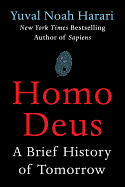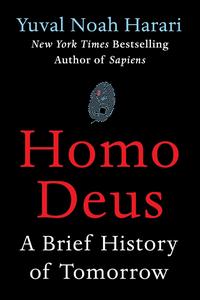
 No less a personage than Barack Obama has described Hebrew University of Jerusalem history professor Yuval Noah Harari's 2015 Sapiens as "interesting and provocative." That's likely to prove an understatement compared to the reception that will greet Harari's unsettling companion work, Homo Deus, one that identifies the "new human agenda as consisting really of only one project (with many branches): attaining divinity."
No less a personage than Barack Obama has described Hebrew University of Jerusalem history professor Yuval Noah Harari's 2015 Sapiens as "interesting and provocative." That's likely to prove an understatement compared to the reception that will greet Harari's unsettling companion work, Homo Deus, one that identifies the "new human agenda as consisting really of only one project (with many branches): attaining divinity."
Harari's thesis is that an emerging religion he calls Dataism--which "collapses the barrier between animals and machines" as it "expects electronic algorithms to eventually decipher and outperform biochemical algorithms"--will gradually overtake, and perhaps supplant, humankind. This new faith, fed by the ceaseless flow of information from our smartphones, computers and devices yet unimagined, will supersede the worldview of liberal humanism--with its emphasis on the exercise of individual free will--that emerged in the late 18th century and eventually triumphed in the 20th over the ideologies of Nazism and Communism.
Homo Deus shares DNA with the work of writers like Jared Diamond (Guns, Germs, and Steel) in its proclivity for synthesizing large swaths of history, while drawing freely from other disciplines in both the humanities and sciences. It's emphatically a work for the general reader eager to grapple with big ideas, but who is equally hungry for context for today's headlines. Harari possesses a well-stocked mind and is an engaging stylist skilled at neatly summarizing arguments--like his contention that overeating is more of a threat to humankind than violence--with memorable, epigrammatic sentences: "Sugar is now more dangerous than gunpowder."
On occasion Harari dwells overlong on arcane subjects like whether animals possess consciousness, or in contending that the idea of an eternal human soul is nothing more than a "monotheist myth." While these excursions are intriguing, and may be fascinating to fans of The Matrix or HBO's Westworld, it's possible to pass lightly over them without losing the gist of his argument.
For someone whose portrait of the human (and potentially post-human) future is as bold as the one sketched out in Homo Deus, Harari's conclusion is restrained. "We cannot really predict the future," he writes. "All the scenarios outlined in this book should be understood as possibilities rather than prophecies." He's neither advocate nor alarmist, but anyone who engages seriously with this challenging work should come away from it with ample motivation to think more deeply about what's around the next bend in the river of human history. --Harvey Freedenberg, attorney and freelance reviewer
Shelf Talker: Historian Yuval Noah Harari envisions a data-driven future in which immortal beings may seek to attain the status of divinity.

